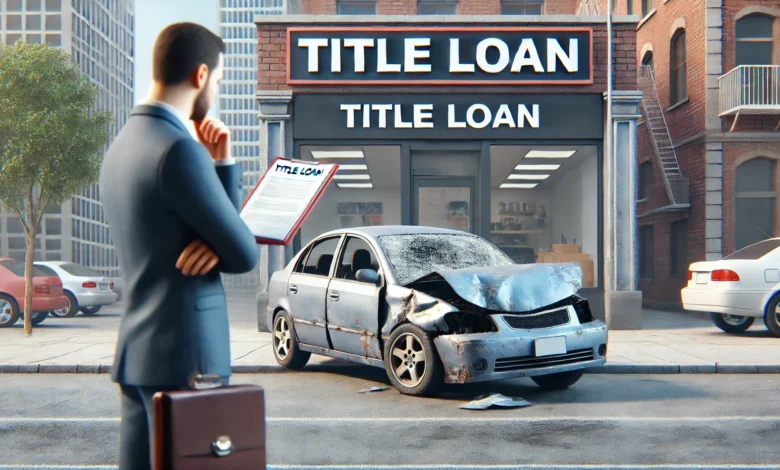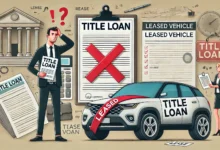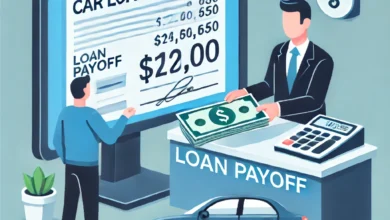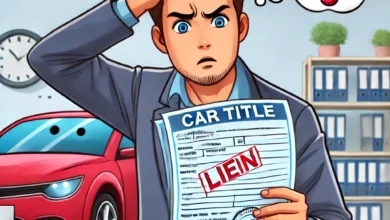Can You Get a Title Loan with a Damaged Car? Comprehensive Guide

When times are tough and finances are tight, a title loan might seem like an easy way to get some quick cash. But what if your car isn’t in pristine condition? Can you still get a title loan with a damaged car? Let’s dive into this topic and uncover every aspect of it in a conversational way.
Understanding Title Loans
First things first, let’s break down what a title loan is. Essentially, a title loan is a type of secured loan where your vehicle’s title is used as collateral. This means if you own your car outright, you can borrow money against it. The lender holds onto your car’s title until the loan is repaid.
So, what does this mean for you if your car has seen better days?
Condition Matters, but It’s Not the Only Factor
The condition of your car does matter when it comes to getting a title loan, but it’s not the only thing lenders consider. The primary concern for lenders is the car’s value. Here’s how it typically works:
- Vehicle Appraisal: The lender will appraise your car to determine its current market value. Even if your car is damaged, it might still hold significant value. Factors like the make, model, year, and mileage of your vehicle play a crucial role in this appraisal.
- Extent of Damage: The type and extent of the damage are also critical. Minor cosmetic damage like scratches or dents may not significantly affect the car’s value. However, major mechanical issues or structural damage could lower the appraisal value.
- Loan Amount: Based on the appraised value, the lender will offer you a loan amount. Typically, lenders offer a percentage of the car’s value, often ranging from 25% to 50%. So, even if your car is damaged, as long as it holds some value, you can still get a loan, albeit a smaller one.
Can You Drive the Car?
Another important aspect to consider is whether the car is drivable. Most lenders prefer that the car is in working condition and can be driven. This is because a functioning vehicle is more valuable and also suggests that you rely on it for transportation, making you more likely to repay the loan to avoid losing it.
However, there are some exceptions.
If the damage to your car is cosmetic or if it’s something that doesn’t affect the car’s drivability, lenders might still be willing to work with you. It’s always a good idea to discuss the specifics of your situation with potential lenders to see what options are available.
Insurance and Repair Considerations
If your car is damaged, you might be wondering if you should get it repaired before applying for a title loan. Here are a few things to keep in mind:
- Insurance Claims: If the damage to your car is covered by insurance, it might be worth filing a claim and getting it repaired before seeking a loan. A repaired car will likely have a higher appraised value, which could result in a larger loan amount.
- Repair Costs vs. Loan Amount: Weigh the cost of repairs against the potential increase in the loan amount. If the repair costs are high and only result in a marginally higher loan amount, it might not be worth the investment.
- Lender Policies: Some lenders might require that certain types of damage be repaired before approving a loa best online pharmacy with fast delivery buy zanaflex online with the lowest prices today in the USAn. Be sure to ask about these policies upfront.
Risks and Responsibilities
Taking out a title loan with a damaged car comes with its own set of risks and responsibilities. Here are a few things to consider:
- High-Interest Rates: Title loans often come with high-interest rates. If you’re already facing financial difficulties, this could make it even harder to repay the loan.
- Shor best online pharmacy with fast delivery buy womenra online with the lowest prices today in the USAt Repayment Terms: Title loans usually have short repayment terms, often 30 days. Make sure you have a clear plan for repayment to avoid additional fees or the risk of losing your car.
- Repossession: If you default on the loan, the lender has the right to repossess your car. Given that your car is already damaged, this could leave you without transportation and with even fewer financial options.
Alternatives to Title Loans
If you’re hesitant about taking a title loan due to the damage to your car or the associated risks, consider exploring other options:
- Personal Loans: If you have good credit, you might qualify for an unsecured personal loan with a lower interest rate.
- Credit Cards: For smaller amounts, a credit card might be a more manageable option.
- Borrowing from Family or Friends: While it can be uncomfortable, borrowing from loved ones might come with more flexible repayment terms.
- Sell the Car: If the damage isn’t too severe, consider selling the car as-is and using the proceeds to address your financial needs.
Final Thoughts
So, can you get a title loan with a damaged car? The answer is yes, but with some caveats. The condition of your car will affect its value and the amount you can borrow. It’s important to understand the risks involved and consider all your options before making a decision.
Remember, a damaged car doesn’t have to be a financial dead end. By exploring your options and making informed choices, you can navigate through financial challenges and find the best solution for your situation.










